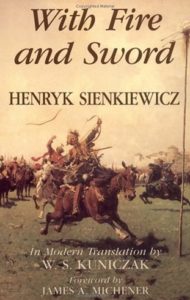Review: With Fire and Sword An Historical Novel of Poland and Russia.
 With Fire and Sword An Historical Novel of Poland and Russia. by Henryk Sienkiewicz
With Fire and Sword An Historical Novel of Poland and Russia. by Henryk Sienkiewicz
My rating: 4 of 5 stars
With Fire and Sword must be one of the greatest historical epics you’ve never heard of. Set in the 17th century, and told from the Polish point of view, it recounts a Cossack uprising against the Polish-Lithuanian Commonwealth. The historical backdrop serves as a grand canvas for the portraits of courage, love, and spiritual devotion that form the heart of the story.
In print, With Fire and Sword is over 1000 pages, but it rarely lags, and never gets bogged down in historical exposition. Published in 1884, its depictions of battle between the Cossacks and the Poles are some of the most harrowing, tense, and vivid scenes I’ve ever read in a historical novel.
The novel was written by Henryk Sienkiewicz, author of Quo Vadis, and the same spiritual depth of that work can be found in With Fire and Sword. I don’t know anything about the history behind the events of the novel, so I can’t comment on the accuracy or bias of the plot. However, if you’re looking for a sweeping epic to huddle down with over the long winter months, I highly recommend it. In many ways, it reminds me of The Lord of the Rings: courageous characters in desperate straits, epic journeys, a living landscape, the potential for tragedy at almost every moment, and even a bit of romance.
I read the free Kindle edition and was very pleased to find it formatted beautifully. There were even a few footnotes. Unfortunately, the pictures and maps were not included, but for a price of $0 I’m not going to complain.
Some of my favorite lines from the book:
the steppe sounded like a lyre touched by the hand of the Lord.
It might have been said at that time that two vampires were careering along both banks of the Dnieper,–one, Hmelnitski, devouring nobles; the other, Prince Yeremi, destroying the uprisen people. It was whispered among the peasants that when these two met the sun would be darkened and the water in all rivers run red.
“…long ago I was reconciled to the will of God. I do not beg, I do not groan, I do not curse. I do not beat my head against the wall; I merely desire to accomplish that which pertains to me while strength and life remain.”
































More than 30 years ago, a Polish exchange student suggested I read this book to better understand Poland. I never have; but this review re-prompts me to do so.